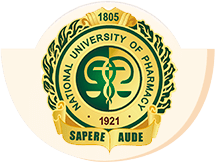Address: 61002, Kharkiv, Pushkins’ka St., 53,
Phone /fax: (057) 706-30-71
E-mail: snt@nuph.edu.ua

Chairman of SSS NUPh: Olena MALA
Registration form participants of students` scientific society (SSS)
List of conferences: Life Sciences, available at the link
The Student Scientific Society (SSS) is an integral part of the activities of NUPh and contributes to the improvement of professional training, identification of gifted youth.
The purpose of the student scientific society is to form a scientific worldview, to help young researchers to master the methodology and methods of scientific research.
Contest «Academic integrity is a guarantee of the quality of education and science»
Work plan of the student scientific society for 2023/2024.
When implementing the tasks of SSS students have the opportunity to:
- learn to work with scientific literature, laboratory equipment, with experimental animals;
- gain experience of public speaking with reports;
- take part in creation of new original substances, biologically active substances, to master methods of the analysis and standardization of medicines;
- perform laboratory, course and diploma works that contain elements of scientific research;
- perform research tasks during production and training practice;
- analyze and summarize the results of experimental research in the form of reports, abstracts, articles, inventions, etc.
The modern student scientific society of NUPh consists of: SSS circles working at each of the departments of NUPh and uniting more than 1000 students, among them – more than 300 foreign students.
To ensure high-quality scientific work of students, the cathedral circles are united in 5 scientific directions:
Chemical and pharmacognostic departments:
- Synthesis of physiologically active substances
- Research of medicinal plants and creation of phytopreparations
- Drug standardization. Pharmaceutical and chemical-toxicological analysis
Medical and biological, clinical departments:
- Preclinical pharmacological study of drugs
- Modern aspects of pharmaceutical microbiology and immunology
- Pathogenetic bases of pharmacotherapy of pathological conditions
- Clinical trials. Pharmaceutical care
- Genetic research, possibilities of use in practice of medicine and pharmacy
- Physiology in medicine and pharmacy: current issues and current achievements
- Laboratory research in clinical medicine
Technological departments:
- Industrial technology and introduction into the production of medicines
- Topical issues of extemporaneous formulation
- Technology of perfumes and cosmetics
- Modern biotechnology
Economic and managerial departments:
- Pharmacoeconomic studies of drugs
- Management and marketing in pharmacy
- Socio-economic research in pharmacy
- Quality management in the pharmaceutical sector of the healthcare sector
- Commodity science
Social, humanitarian, physical and mathematical departments:
- Information technologies in pharmacy and medicine
- Pharmaceutical law and forensic pharmacy
- Social sciences and philology
- Psychological and pedagogical principles of becoming a future specialist in modern free economic zones
SSS, together with the Council of Young Scientists, annually holds a scientific-practical conference “Topical issues of creating new drugs” , which since 2012 has acquired international status. The results of scientific research are published in the Collection of abstracts of the NUPh publishing house. The priority language of the conference is English.
Every student who has a desire to deepen their knowledge, as well as to take part in research work can become a member of SSS.
Upon success in scientific and educational activities, a member of the SSS receives recommendations for admission to graduate school. According to the Department of Postgraduate Studies, 95% of undergraduates and graduate students during their studies at NUPh were members of the SSS department’s scientific societies.


